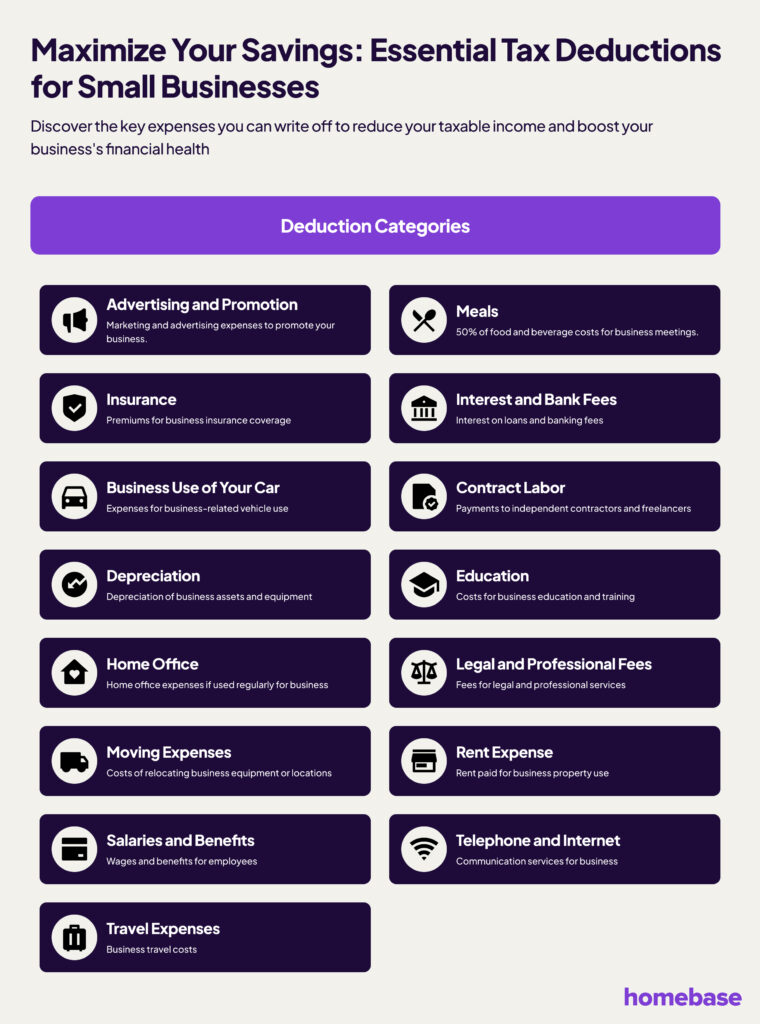Taxes are a major business expense, which is why many employers look for ways to decrease their tax liability. There are several options for small business payroll tax rebates and avenues of payroll tax relief for small businesses you can take advantage of to lower your tax payment.
Take a look at these tips and tricks on how to optimize your tax preparation in order to minimize your payments to the federal government and use that money instead to improve your business.
Stay Up to Date on Your Bookkeeping
A great way to prepare and take advantage of any tax reductions you may qualify for when it comes time to file your taxes is to maintain your bookkeeping throughout the year. Save all your receipts for business expenses and monitor what you’re spending money on.
Taking stock of your finances will not only help you mitigate cash flow issues and make accurate forecasts but will also make your tax return preparation easier, whether it’s you or a tax professional getting the job done.
The receipts you save for essential items could reduce your tax bill if you can claim them as business expenses and receive deductions.
Keeping up with the books will also allow you to prepare for your tax costs. Once you’re on top of your monthly budget, you can set aside a monthly amount for taxes instead of having to pay a lump sum at the end of the year.
Learn What Tax Deductions You Are Eligible For

A tax deduction, also known as a “write-off,” is a business-related expense that you can subtract from your taxable income. Eligible employers can take advantage of these deductions to reduce their tax liability. However, the IRS has certain criteria around what counts as a deduction and what doesn’t.
Here are some of the most popular deductions businesses use to lower tax payments. You can use this IRS guide to learn more about each deduction:
- Advertising and promotion
- Meals
- Insurance
- Interest and bank fees
- Business use of your car
- Contract Labor
- Depreciation
- Education
- Home office deductions
- Interest
- Legal and professional fees
- Moving expenses
- Rent expense
- Salaries and benefits
- Telephone and internet expenses
- Travel expenses
Pick the Right Corporation Type
Your ability to influence your tax liability begins with learning what you can do based on your corporation type. Let’s take a look at how these different structures affect you at tax time.

Sole Proprietorship
A sole proprietorship is ideal for one-person businesses with no salaried employees. Whatever money you earn goes directly to you and the government taxes that money as personal income. Independent contractors do have to pay a Self-Employment (SE) Tax on their 1040. This makes up the portions of Medicare and Social Security taxes that an employer would normally pay on your behalf.
One potential worry is that since you’re lumping your personal and business liabilities together, the IRS can come after you if you fall behind in payments or commit other costly errors.
Partnership
A partnership operates something like a shared proprietorship as opposed to a sole proprietorship. You and one or more partners do your part to grow the company and help it thrive.
In return, you all share equally in the profits (and losses) without actually being on the books as employees. The IRS taxes partnerships individually, as if they were sole proprietors, except that the tax burden is shared equally among the partners.
Full Corporation (C-Corp)
A C-Corp lies at the opposite end of the spectrum from a sole proprietorship. These structures offer the ultimate protection against lawsuits and other liabilities, which might be passed on to business owners or other team members.
The corporation is designed as a “shell” that takes the brunt of such attacks. C-Corps have the added financial advantage of being able to put their stocks up for sale when they need or want additional capital.
Tax-wise, however, C-Corps suffer from a “double whammy” effect. Expect the IRS to tax your corporation, not once, but twice. In addition to the taxes you’ll have to pay on the corporation’s profits, you’ll also have to pay taxes on any shareholder dividends your team has enjoyed.
Subchapter S Corporation (S-Corp)
If your business has less than 100 shareholders, you might consider structuring your company as an S-Corp. An S-Corp can pass substantial business income, losses, debts, and deductions to its shareholders, freeing you from paying taxes on them at the corporate level.
The shareholders then pay taxes on this income, and on any “reasonable compensation” they receive through wages, on their individual tax returns. As nice as this ability sounds, the “reasonable compensation” requirement can trip you up if you’re not careful.
The IRS pays close attention to whether you’re just paying token wages or actually giving employed individuals wages based on their skill. At the same time, salaries exceeding $500,000 must go through the extra step of being listed on Form 1125-E.
Limited Liability Corporation (LLC)
Technically, an LLC isn’t treated as a corporate business entity by the IRS. The term applies to a “membership” of top-level owners and team members who exist separately from their corporate entity.
While the IRS can tax an LLC as a sole proprietorship, partnership, C-Corp or S-Corp, LLC membership may grant you some interesting advantages over, say, a standard S-Corp formation. For example, “reasonable compensation” that an S-Corp requires doesn’t pin down an LLC, so you don’t necessarily have to pay wages to yourself.
Get a Retirement Plan
You can receive a tax credit for automatically enrolling workers into a retirement plan under the SECURE Act to help offset the costs of starting the plan. You can also deduct your contributions. An easy option is a Simplified Employee Pension (SEP).
Under the plan, you can contribute up to 25% of all eligible employee’s gross annual income. Employees are eligible as long as they are over the age of 21 and make at least $650 in wages from your business annually.
Donate to Charity
Donating to charity is not only a nice thing to do—it can also reduce your taxable income. There are a few guidelines, however.
The charity you choose must be a bona fide 501(c)(3) organization. You can search for it with this IRS tool to determine if it falls under this category.
The IRS allows you to deduct 50% of donations to 4 types of organizations:
- Public charities
- Private operating foundations
- Foundations that distribute donations to private operating foundations and public charities within 2.5 months from when the contributions are received
- Private foundations that pool contributions and eventually pay them to public charities
Plan Out Your Income
One option for decreasing your tax liability is to defer income. The IRS will include whatever you receive by December 31 in your total income for the year, so you can decrease your tax payments by postponing it to after January 1. This is helpful if you anticipate being in a lower tax bracket next year.
If you operate on a cash basis, you can defer income by extending payment dates to after the new year or send your invoices later than usual. This means the IRS won’t count them in the previous year’s income and you’ll have more time to make those tax payments.
You can also accelerate income if your business is doing well and you anticipate being in a higher tax bracket next year. To do so, you can try and collect as many invoice payments before the year ends so the IRS taxes more of your income for the current year instead of the next one.
You should only accelerate or defer your income if you have a solid handle on your finances. Consider speaking with a tax professional before making this decision.
PPP Loan Taxes
Here are a few answers to common questions around how your taxes will be affected if you received a Paycheck Protection Program loan due to COVID-19.
Does The IRS Tax Forgive PPP Loans?
Forgiven PPP loans are not taxable, according to the Small Business Administration (SBA). This means your loan won’t count as income.
Can You Deduct Expenses Paid with a PPP Loan?
The normal business expenses you spend your PPP loan on can be deducted from your taxable income. According to recent legislation, “no deduction shall be denied or reduced, no tax attribute shall be reduced, and no basis increase shall be denied.”
Can You Still Claim the Employee Retention Credit?
Eligible businesses can still claim the Employee Retention Tax Credit for a break on employment taxes, but earnings paid with your forgiven PPP funding do not count as qualified wages. However, you can claim the credit for wages you paid above the forgiven amount.
To qualify, you must prove that you continued to pay your team while temporarily shutting down or suffering a 20% decrease in gross receipts.
Consistency in Reporting Income
Filing taxes is a task that no business owner can afford to neglect. Submitting accurate figures to the IRS involves not just ethical considerations but also practical ones. When you receive 1099-MISC forms from clients, you should know that the IRS gets copies as well. These forms are used by the IRS to cross-verify the income you declare. Any inconsistency between your reported income and the 1099 forms can trigger scrutiny. Moreover, even if a client doesn’t issue a 1099, it’s your responsibility to disclose that income. Doing otherwise can cause unnecessary complications and may even result in financial penalties or legal issues.
Imperative of Keeping Proper Records
Staying organized with your financial records is a key element in ensuring a smooth tax process. If your records are incomplete or inaccurate, you run the risk of either missing out on tax deductions or inviting a financial audit, either of which can be detrimental to your business. With organized financial records, you’re not only better prepared for tax season, but you’re also better equipped to analyze your business’s financial performance and make informed decisions.
Demarcating Personal and Business Expenses
One mistake that small business owners often make is mixing personal expenses with business transactions. The IRS takes a dim view of this practice. If you use your business account for personal expenses, the IRS is likely to extend its scrutiny to your personal finances as well. This situation is avoidable by keeping separate bank accounts and credit cards for your business. By doing so, you’ll not only have a clear understanding of your business finances but will also streamline the auditing process, should the need arise.
Clarifying Gross and Net Income
It’s common for entrepreneurs to misunderstand the terms’ gross income’ and ‘net income,’ which can result in flawed business decisions. Gross income is the money you earn before any deductions, whereas net income is what remains after all expenses have been accounted for. For instance, you might sell a product for $150 that costs you $100 to make, resulting in a gross income of $50. However, additional expenses could bring your net income down to a significantly lower figure. Knowing the distinction between gross and net income can help you set accurate pricing strategies, realistic goals, and appropriate budgets for your business.
Need Help with Payroll Taxes?
Homebase payroll is the perfect solution. We make payroll easy by instantly converting your timesheets into hours and wages. When you run payroll, Homebase calculates taxes and paychecks, sends direct deposits to your team, and automatically pays and files your payroll taxes. Plus, your employees get on-demand access to their pay stubs, W-2s, and 1099s in the Homebase app.

